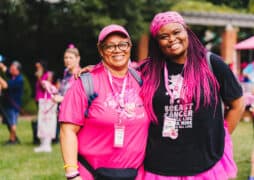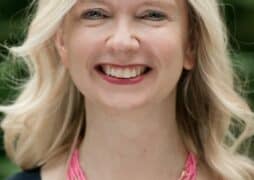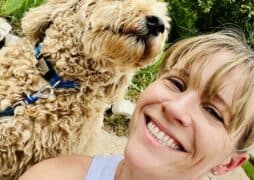At age 34, Rebecca Seago-Coyle was told by her doctors and medical staff that she was too young to have breast cancer. But a suspicious lump, a family history of breast cancer and genetic testing proved otherwise. Seago-Coyle, a Komen Advocate in Science, discusses the importance of knowing your family health history.
Komen: What does it mean to know your family history?
Seago-Coyle: It’s not only just knowing that you have cancer in your family, it’s knowing when their cancer occurred. It’s really important to know when screenings should happen. It helps you be more proactive about your health. Once I found out that I had a genetic mutation that increases the risk of developing breast cancer, my doctors told me, “Oh, you actually qualified for mammograms when you were 18.” Good information, but not helpful when I was 35 and had already been diagnosed with breast cancer.
Komen: Has knowing that information made you a better advocate for yourself?
Seago-Coyle: As a young woman who has been diagnosed with breast cancer, it is really important to advocate for yourself. What I always tell people now is, “You’re the CEO of you. You know you better than anyone else. You’re with you 24/7. The doctors, your team, are only with you for a short time. So, it’s best to try to communicate what you want, what your goals are in life and that sort of thing, and if something doesn’t feel right, then it’s okay to say, ‘Hey, this doesn’t feel right,’ and just try to keep advocating for yourself. If you’re not getting the answers you need from one doctor, it’s okay to go find another doctor and see who will listen to you.”
Komen: What else do you think patients should know so they can get the best care?
Seago-Coyle: I think finding and connecting with other people who have a similar diagnosis is important. I feel like you get more resources and more connection from someone else who has been through it. I think you’ve got to know what questions to ask. When you’ve just been diagnosed with breast cancer, you know you need to ask questions, but you don’t know what those questions are. You don’t know what it’s about. It’s more about empowering yourself to know what you want and communicating those goals back to your doctor.
Komen: You’ve had family members and friends diagnosed with breast cancer, so you’ve experienced it as a patient and a supporter. What have you learned about having a support system in place?
Seago-Coyle: Once you’ve been diagnosed with cancer, you quickly find out who is on your team and who are your allies. Who can you go to for certain things? You have to know who can you go to for support. Who can I call to say, “Hey, I’m having a bad day; I just need to vent.” Everyone in your support system plays a different role, so just understanding who those people are is important to figure out. I think everyone’s first reaction is, “Oh, just give me a call if you need anything.” Well, I’m not necessarily going to call anyone. If I need something, I’ll just do it myself. But, if you have a friend who is going through something, instead of saying, “Just call me,” say, “Hey, I’m headed to the grocery store. Is there anything I can pick you up?” Or, if they’re far away, “Do you need help with ordering things?”



